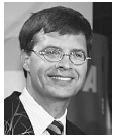THE NETHERLANDS
Jan Peter Balkenende
Prime Minister

(pronounced "YAWN PAY-ter BAHL-kay-nehnd")
"The Dutch government has made security one of its priorities. When our security is at stake, we cannot compromise or turn a blind eye. When one person threatens another, it strikes at the very foundations of our free, democratic society."
The Kingdom of the Netherlands is the largest of the three Benelux countries, the other two being Belgium and Luxembourg. The country shares its borders with Belgium to the south and Germany to the east; the northern and western shores face the North Sea. Though the Netherlands is often called Holland, this is in fact the official name of two of its 12 provinces, Nord Holland and Zuid Holland. Also considered part of the Netherlands is the Netherlands Antilles, an island group in the Caribbean. The Netherlands's 33,883 sq km of land (about 13,104 sq mi) are home to nearly 16.1 million people (2002 estimate), making it the most densely populated nation in Europe. A quarter of the country's land has been reclaimed from the sea by the use of dikes and coastal dunes, and nearly two-thirds of the population lives below sea level. The capital and largest city is Amsterdam, while the seat of government is The Hague. Approximately 31% of the population is Roman Catholic while 21% are Protestant. The official language is Dutch.
The Netherlands has traditionally been a major maritime power and still boasts a large merchant fleet; Rotterdam is the world's busiest port. Foreign trade plays a large part in the economy and merchandise exports are equal to almost 50% of the country's gross domestic product (GDP). Major exports include machinery, chemicals, and agricultural products. The Netherlands is a member of the European Union (EU) and nearly 80% of its trade is with other EU-member nations, with the primary destinations being Germany, Belgium, and the United Kingdom. The Netherlands has, by and large, avoided the economic sluggishness that has plagued continental European economies over the last few years. Unlike some of its neighbors, the Dutch economy has continued to grow and is currently averaging about 4% per year. The per capita GDP stood close to US $26,900 (2002 estimate). In 2002, the Netherlands became one of twelve EU nations to adopt the euro as its official currency.
ADDRESS
Office of the Prime Minister
Binnenhof 20, POB 2001
2500 EA, The Hague, The Netherlands
Comment about this article, ask questions, or add new information about this topic: